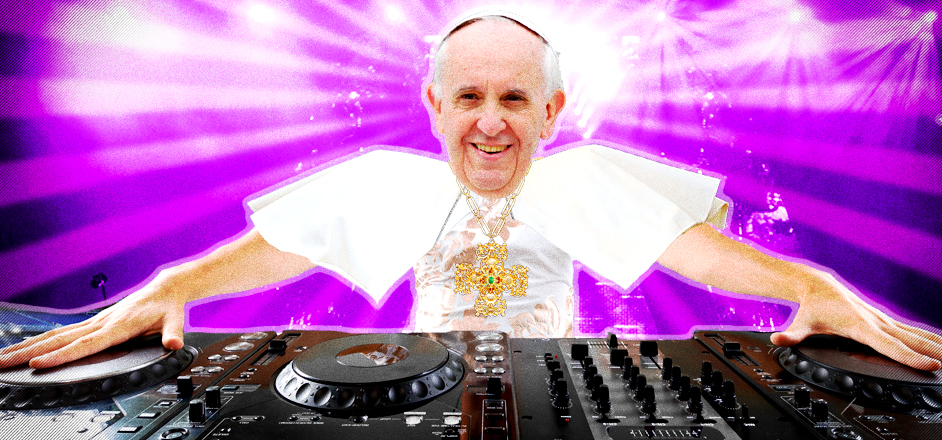The millennial generation may be among the youngest, yet its members are old enough to understand traditional values and mature enough to reject them outright.
That’s why today, a historically low number of young people ascribe to organized religion. According to the Pew Research Center, millennials are less likely than any earlier generation to believe in God with certainty, pray and attend services, or consider religion an important part of their lives.
Understandably, this has organized faith fearing the future. The Catholic church in particular is desperate for prospective parishioners to fill their donation baskets with cash and bankroll their elaborate stained-glass ceilings.
In their efforts to lure the least religious generation to Sunday masses, the church has made a number of attempts to seem cool, hip, and “with it.” Among their most tragic struggles for modern relevance are the following strategies…
Confessions via Snapchat

In an endeavor to save the youth from an afterlife in Satan’s fiery inferno, an ordained priest in San Antonio, Texas, began encouraging digital confessions over Snapchat. After over 23 years as a member of the clergy, the messenger of God created the account @PriestDavid to receive self-destructing, soul-saving admissions.
Father David boasted that his modernized take on the age-old tradition engages young adults and protects their anonymity. But the practice evoked anger among many other religious leaders, including an uptight Archbishop, who argued that Catholic confessions must occur behind a divider or face-to-face in order to adequately absolve your sins.
Whether or not the super-hip priest’s Snapchat approach is effective, we’ll stay on the safe side and continue sending him confessions every time we have pre-marital butt sex.
—–
Translating The Bible into emojis

For the youngsters who prefer fun cartoons over boring old words, their prayers were finally answered with the creation of "Bible Emoji: Scripture 4 Millennials," a present-day adaptation of the Good Book that’s been translated into emojis.
By substituting words like God with the smiley halo emoji, the Holy Ghost with the spooky ghost emoji, and peppering in plenty of the prayer hands emoji, the scripture speaks in online vernacular that authors were sure would resonate in today’s Internet culture.
The idea to make long, boring books more enjoyable by converting them into emoticons didn’t necessarily start here. For example, before The Bible, the English class classic "Moby Dick" was translated into "Emoji Dick" — although we wouldn’t recommend it the night before an exam.
The full edition of the emojified Bible is available on iTunes, but those who don’t want to pay for animated iPhone scripture can still rejoice! Because countless excerpts can be found on Bible emoji’s Twitter, and your own favorite verses can be converted into symbols with the Bible emoji translator tool. Hallelujah!
—–
Rock churches

At modern-day “rock churches,” Sunday mornings sound more like a classic rock concert than a religious service. Strobes shoot out from behind the band as thousands of young voices echo the soulful sounds of an epic Christian rock-ballad.
At these contemporary churches, bands of musicians are the preachers and jams reminiscent of a Pearl Jam album are the gospel. Church-goers gather at venues with state-of-the art sound systems, enormous stages and stadium seating, then worship the Lord with a holy headbanging.
The young followers of modern rock churches attest that this approach sets them apart from the stereotypical Bible-thumping conservatives. Instead of rejecting rock 'n' roll as the devil’s music, they’re embracing it as an instrument of the Big Man himself.
More than any other approach, this brand of Christian cool seems to have struck a chord with today’s generation, as services at Elevation Church in North Carolina, Revolution and Hillsong (both in New York City), boast far more youngsters than their traditional church counterparts. Apparently, young people are far more inclined to find God within the riffs of an electric guitar solo.
—–
The cool and progressive Pope Francis

Pope Francis has single-handedly altered the public perception of organized Catholicism, re-branding the image of the church with his hip, liberal perspectives.
He’s been applauded as the ideal religious leader of our modern age for his radical statements — insisting atheists can go to heaven, encouraging environmental action to prevent climate change, and inspiring transformation in the church’s stances on divorce, abortion, same-sex marriage and contraception.
Especially among millennials, these revolutionary attitudes are making waves. Pope Francis has become a prominent public figure in the eyes of young generations for his social media presence on Twitter and even Instagram. Seeing a figurehead of the Catholic church with a fluency in Internet culture offers a refreshing take on what many young people formerly saw as an outdated institution with antiquated leadership.
At this point, it’s safe to assume Pope Francis is also a proponent of silent discos, owns a Playstation and an Xbox and regularly uses the word “woke.”
—–
Fuddy-duddy schemes like Snapchat confessions and emoji Bibles might offer a laugh, but it seems they’re not enough distraction from the ‘diddling little boys’ scandal to tempt enough young people into their theology. So, sorry dope Pope — not even you can save our souls.



Leave a Reply